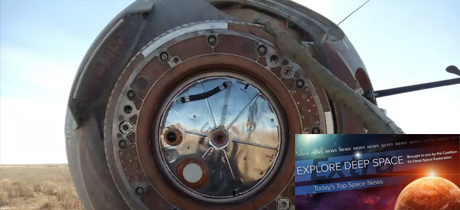In Today’s Deep Space Extra… NASA astronaut Nick Hague and cosmonaut Alexey Ovchinin were reported to be okay by NASA early Thursday after the Soyuz rocket launching them to the International Space Station (ISS) from Kazakhstan experienced a problem. The capsule with the two space explorers descended to Earth in Kazakhstan.
Human Space Exploration
Live coverage: Two-man crew to launch on six-month Space Station expedition
Spaceflightnow.com (10/11): Russia’s launch of the Soyuz MS-10 with NASA astronaut Nick Hague and Russian cosmonaut Alexey Ovchinin experienced a first stage issue that prompted a ballistic descent back to Earth. The liftoff from the Baikonur Cosmodrome in Kazakhstan occurred on time at 4:40 a.m.., EDT, and the two men were to dock with the Space Station at 10:44 a.m., EDT. Russian led search and rescue teams were deployed and expected to reach the landing site within 90 minutes of the liftoff. At 5:20 a.m., EDT, NASA reported the capsule with the two men had returned to Earth in Kazakhstan and they were good condition. Spaceflightnow.com was providing new updates through its web site. NASA, www.nasa.gov/station and www.nasa.gov/live is offering updates as well.
NASA inspector general sharply criticizes SLS core stage development
Coalition Member in the News – Boeing
SpaceNews.com (10/10): A report by NASA’s inspector general October 10 criticized both NASA and Boeing for delays and cost overruns in the development of a key component of the Space Launch System (SLS), and warned of more delays and overruns to come.
Space Science
U.S. scientists have laid out a plan to search for life in the universe
Quartz (10/10): A report from the National Academy of Sciences presented Wednesday calls on NASA and others involved in the search for life beyond the Earth to widen the search and the kinds of participants, while looking to forge new partnerships with donors and businesses. The nearly 200 page report calls on those involved to rely on more science disciplines, employ genetic sequencers and challenging technologies that will permit space observatories to better assess the atmosphere of planets circling nearby stars for indications of biological activity.
Mysterious deep-space flashes: 19 more ‘Fast Radio Bursts’ found
Space.com (10/10): Scientist report they are getting a handle on Fast Radio Bursts, powerful flashes of energy from the distant cosmos first noticed in 2007. A study assessing 19 of the bursts, perhaps generated by fast spinning neutron stars, or perhaps intelligent civilizations, was published Wednesday in the journal Nature.
Other News
Air Force awards launch vehicle development contracts to Blue Origin, Northrop Grumman, ULA
Coalition Members in the News – Northrop Grumman, United Launch Alliance
SpaceNews.com (10/10): The U.S. Air Force announced Wednesday it is awarding $2 billion over three contracts to Blue Origin, Northrop Grumman and United Launch Alliance (ULA) for the development of launch system prototypes. The development focus is on Blue Origin’s New Glenn, Northrop Grumman’s OmegA and ULA’s Vulcan Centaur.
Blue Origin resets schedule: First crew to space in 2019, first orbital launch in 2021
GeekWire.com (10/10): Blue Origin, the suborbital launch services company founded by Amazon billionaire Jeff Bezos, plans to launch its first crew on a suborbital space trip during the first half of 2019. It plans the launch of its first orbital-class New Glenn rocket in 2021. Each represents a delay of about one year. CEO Bob Smith outlined the changes at the Aerospace Futures Alliance Summit.
Betty Grissom, widow of astronaut Virgil ‘Gus’ Grissom, dies
Associated Press via New York Times (10/10): Betty Grissom, wife of Mercury 7 astronaut Gus Grissom, the second American to launch into space, has died. Betty Grissom, 91, died Sunday at home, according to a relative. Her husband perished in the 1967 Apollo 1 fire with two other astronauts.

